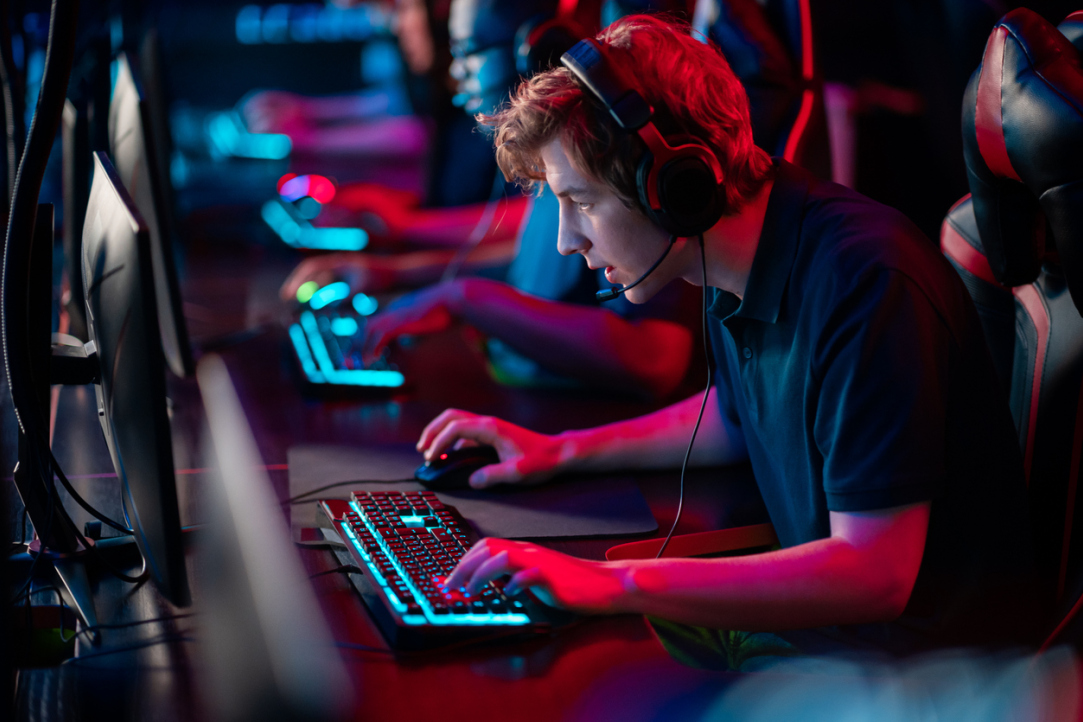Esports Players Play Better Online

In competitions, esports players, like other athletes, face stress and show worse results due to pressure. A substantial decrease takes place in the performance of esports players during overtime. This effect, however, is significantly mitigated in online competitions compared to live events—the difference can reach 30%. A study by a team of authors from HSE University’s Moscow and Perm campuses and European University Viadrina (Germany) explores the phenomenon of choking under pressure within the context of esports. The study was published in the Journal of Economic Behavior & Organization.
Esports is a multibillion-dollar industry with major tournaments and million-dollar prizes. In addition, in Russia, esports has become a priority area of development. As in traditional sports, both technical skills and psychological stability are key to success. Understanding how stress affects the performance of players will help to improve the training process and achieve better results.

Gleb Vasiliev
Gleb Vasiliev, Junior Research Fellow at the Laboratory of Sports Studies of the Faculty of Economic Sciences, Petr Parshakov and Iuliia Naidenova, staff members of the International Laboratory of Intangible-driven Economy at HSE University in Perm, and Igor Tylkin, researcher at European University Viadrina, studied the behaviour of esports players in the game Counter-Strike: Global Offensive (CS:GO).

Petr Parshakov
CS:GO is a competitive online shooter in which two teams of five players compete. Matches are usually played on 1–5 maps, which in turn consist of short rounds. To win the round, teams must either complete a specific task or eliminate their opponents. Usually, 30 rounds are played on one map in competitions. When a team wins at least 16 of them, it wins the map. In the event of a draw, additional rounds are played: at 15:15, overtime starts. The team of scientists analysed players’ behaviour in overtime.

Iuliia Naidenova
The authors studied statistics from almost a million games for the period from 2012 to 2022 among players with both high and low ratings. The sample included more than 1,700 esports players. The researchers used two key indicators.
The first was individual performance, which included the player’s rating (calculated by comparing a player's average performance statistics to the same averages for CS:GO in general calculated over a period of time) and the percentage of accurate shots. These metrics reflect the level of skill in difficult conditions. The second is team coordination, ie cases of ‘friendly fire’ (causing damage to teammates). An increase in the number of hits on teammates may indicate tension and problems with communication in the team. Pressure and stress were measured by analysing overtimes—additional rounds that are played to determine the winner in the event of an equal outcome in matches. As in traditional sports, in extra time, the result of the game most often depends on numerous small factors. In addition, the authors studied the impact of the game format: whether it was an on-site performance or an online tournament. Approximately 70% of the matches were played online, and overtimes were played in 9% of them.
It turned out that overtimes do cause players significant stress. On average, they lead to a decrease in player ratings by almost 2%, and the percentage of accurate shots decreased by 7%. This decline was evident in both professional and novice players. ‘The results of our study show that although experienced players outperform their less experienced counterparts in all game formats, this advantage may fade away in overtime,’ noted the authors. The probability of errors leading to friendly fire also increased.
The tournament format plays an important role. When competitions are held online, with no audience or unnecessary excitement, players perform about 30% better than during on-site matches. Researchers attribute this to a psychological factor—the presence of fans increases stress.
The researchers note that the results of the study can be applied in various fields. For example, it is worth considering that the format of work (on-site or online) significantly influences stress levels and their impact on team coordination and individual results. ‘Esports is a good platform for testing such effects. Players’ high cognitive activity and team coordination are essential in the game, which makes it a convenient object for analysing behaviour under pressure. The study results can be useful for HR departments and crisis management, as well as in fields where teamwork and productivity under pressure are important, such as IT consulting or startups,’ the authors added.
See also:
Habits Stem from Childhood: School Years Found to Shape Leisure Preferences in Adulthood
Moving to a big city does not necessarily lead to dramatic changes in daily habits. A study conducted at HSE University found that leisure preferences in adulthood are largely shaped during childhood and are influenced by where individuals spent their school years. This conclusion was drawn by Sergey Korotaev, Research Fellow at the HSE Faculty of Economic Sciences, from analysing the leisure habits of more than 5,000 Russians.
Russian Scientists Reconstruct Dynamics of Brain Neuron Model Using Neural Network
Researchers from HSE University in Nizhny Novgorod have shown that a neural network can reconstruct the dynamics of a brain neuron model using just a single set of measurements, such as recordings of its electrical activity. The developed neural network was trained to reconstruct the system's full dynamics and predict its behaviour under changing conditions. This method enables the investigation of complex biological processes, even when not all necessary measurements are available. The study has been published in Chaos, Solitons & Fractals.
Scientists Propose Novel Theory on Origin of Genetic Code
Alan Herbert, Scientific Supervisor of the HSE International Laboratory of Bioinformatics, has put forward a new explanation for one of biology's enduring mysteries—the origin of the genetic code. According to his publication in Biology Letters, the contemporary genetic code may have originated from self-organising molecular complexes known as ‘tinkers.’ The author presents this novel hypothesis based on an analysis of secondary DNA structures using the AlphaFold 3 neural network.
See, Feel, and Understand: HSE Researchers to Explore Mechanisms of Movement Perception in Autism
Scientists at the HSE Cognitive Health and Intelligence Centre have won a grant from the Russian Science Foundation (RSF) to investigate the mechanisms of visual motion perception in autism. The researchers will design an experimental paradigm to explore the relationship between visual attention and motor skills in individuals with autism spectrum disorders. This will provide insight into the neurocognitive mechanisms underlying social interaction difficulties in autism and help identify strategies for compensating for them.
Scholars Disprove Existence of ‘Crisis of Trust’ in Science
An international team of researchers, including specialists from HSE University, has conducted a large-scale survey in 68 countries on the subject of trust in science. In most countries, people continue to highly value the work of scientists and want to see them take a more active role in public life. The results have been published in Nature Human Behaviour.
Education System Reforms Led to Better University Performance, HSE Researchers Find
A study by researchers at the HSE Faculty of Economic Sciences and the Institute of Education have found that the number of academic papers published by research universities in international journals has tripled in the past eight years. Additionally, universities have developed more distinct specialisations. Thus, sectoral universities specialising in medical, pedagogical, technical, and other fields are twice as likely to admit students to target places. The study has been published in Vocation, Technology & Education.
Scientists Record GRB 221009A, the Brightest Gamma-Ray Burst in Cosmic History
A team of scientists from 17 countries, including physicists from HSE University, analysed early photometric and spectroscopic data of GRB 221009A, the brightest gamma-ray burst ever recorded. The data was obtained at the Sayan Observatory one hour and 15 minutes after the emission was registered. The researchers detected photons with an energy of 18 teraelectronvolts (TeV). Theoretically, such high-energy particles should not reach Earth, but data analysis has confirmed that they can. The results challenge the theory of gamma radiation absorption and may point to unknown physical processes. The study has been published in Astronomy & Astrophysics.
Chemists Simplify Synthesis of Drugs Involving Amide Groups
Chemists from HSE University and the Nesmeyanov Institute of Organoelement Compounds of the Russian Academy of Sciences (INEOS RAS) have developed a new method for synthesising amides, essential compounds in drug production. Using a ruthenium catalyst and carbon monoxide under precisely controlled reaction conditions, they successfully obtained the target product without by-products or complex purification steps. The method has already been tested for synthesising a key component of Vorinostat, a drug used to treat T-cell lymphoma. This approach could lower the cost of the drug by orders of magnitude. The paper has been published in the Journal of Catalysis. The study was supported by the Russian Science Foundation.
Scientists Examine Neurobiology of Pragmatic Reasoning
An international team including scientists from HSE University has investigated the brain's ability to comprehend hidden meanings in spoken messages. Using fMRI, the researchers found that unambiguous meanings activate brain regions involved in decision-making, whereas processing complex and ambiguous utterances engages regions responsible for analysing context and the speaker's intentions. The more complex the task, the greater the interaction between these regions, enabling the brain to decipher the meaning. The study has been published in NeuroImage.
Scientists Present New Solution to Imbalanced Learning Problem
Specialists at the HSE Faculty of Computer Science and Sber AI Lab have developed a geometric oversampling technique known as Simplicial SMOTE. Tests on various datasets have shown that it significantly improves classification performance. This technique is particularly valuable in scenarios where rare cases are crucial, such as fraud detection or the diagnosis of rare diseases. The study's results are available on ArXiv.org, an open-access archive, and will be presented at the International Conference on Knowledge Discovery and Data Mining (KDD) in summer 2025 in Toronto, Canada.


